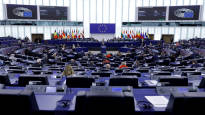The EU will take a sharp turn to the right in the June European elections, predicts the European Council on Foreign Relations think tank in his recent forecast.
The conservative ECR parliamentary group, which includes Eurosceptic parties to varying degrees, can even become the third largest parliamentary group. From Finland, Perussuomalaiset belongs to ECR.
ECFR predicts electoral victory for far-right parties in Austria, Belgium, the Czech Republic, France, Hungary, Italy, the Netherlands, Poland and Slovakia.
Far-right parties would be ranked second or third in Bulgaria, Estonia, Finland, Germany, Latvia, Portugal, Romania, Spain and Sweden.
According to the think tank’s forecast, with the victories of the far-right parties, almost half of the seats in the European Parliament would go outside of the so-called “super grand coalition”, which has run the parliament together for a long time.
The aforementioned include the big groups of the political center: the center-right EPP, the center-left S&D and the liberal RE.
According to the forecast, all of these will lose seats to the far-right parliamentary groups, ECR and ID.
The think tank predicts that ECR will get 18 additional seats. ID, which brings together nationalist and Eurosceptic parties, is predicted to get as many as 40 additional seats.
However, the EPP would remain the largest parliamentary group and the S&D the second largest.
Currently, the fourth largest Greens / European Free Alliance (G/EFA) would lose seats in the forecast so that ECR would pass the group in terms of seats.
ECR could even become the third largest parliamentary group. This depends on Hungary. Prime minister Viktor Orbán may decide to take his Fidez party from among the non-aligned to the ECR. If this happens and the votes are distributed according to the forecast, ECR will pass RE as the third largest parliamentary group.
The balance of power is renewed
What would the new balance of power mean for European politics?
According to ECFR’s forecast, ECR and ID would be more important players in the upcoming European Parliament than before. When these would find a common line with the big EPP, they could get victories, especially in the votes concerning the economic and legislative freedom of the EU member states.
The growing power of the far-right in the European Parliament would affect, for example, decisions regarding immigration.
The far-right is united by pushing for a stricter immigration policy, which has been a significant source of popularity for Sweden’s Sweden Democrats and France’s National Alliance, among others. As the power of the right-wing parties in the European Parliament grows, they would together be able to influence the legislation on immigration and the asylum system even more significantly.
Another thing that unites Eurosceptic parties is the increase of the EU member states’ own decision-making power in relation to the countries’ own legislation and legal systems. For example, the main themes of Hungary’s Fidez and Poland’s PiS are opposition to the central power of Brussels in the aforementioned.
Climate issues unite the far right
According to ECFR, the success of the far right would have the greatest impact on climate policy. Up until now, center-left and left-wing parties have won votes on climate action by very small majorities.
With the distribution of seats according to the forecast, the far-right could significantly influence, for example, the votes concerning the EU’s common climate goals.
Although the European Parliament is not as significant a factor in the EU’s foreign policy as the European Council or the Commission, there could also be changes in the votes related to foreign relations.
For example, supporting Ukraine divides far-right parliamentary groups more than centrist groups. The parties of the ID parliamentary group that have a negative attitude towards arming Ukraine include the French National Alliance, the German AfD, the Austrian FPÖ and the Belgian Vlaams Belang.
EU enlargement is its own question. At the end of last year, the member states decided to start membership negotiations with Ukraine and Moldova, to give Georgia the status of a candidate country, and to start accession negotiations with Bosnia-Herzegovina. Eurosceptic parties have traditionally been against enlargement.
When it comes to arms aid to Ukraine and EU expansion, the far-right can also find like-minded people across the boardroom: some MEPs from far-left parties voted against accepting Ukraine’s EU membership application, for example.
